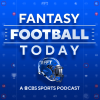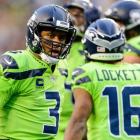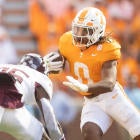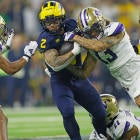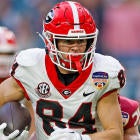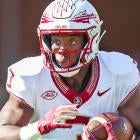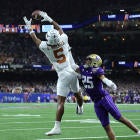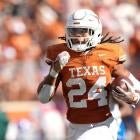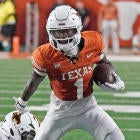If you don't think about it too hard, Thursday Night Football was a great game. There were tremendous plays, to be sure, and everything came down to the final kick.
It was also a clinic of poor decision-making that shouldn't happen at the sport's highest level, not in 2019, not in an era when thousands of Twitter users can (rightfully) call out the mistakes being made in real time.
I mentioned in last week's Stealing Signals how football is a game of possessions. They are a finite resource, like outs in baseball. In 2018, every team in the NFL averaged between 10.4 and 12.6 drives per game. It's possible to create more drives, but not many — you're not getting 20 chances to score points.
For a coach who loves to run the football to presumably impose his team's will and control the flow of the game, Pete Carroll shows a tremendous lack of understanding of how to actually go about that, because he doesn't seem to understand it's possessions, not time of possession, that matters.
Before the half, the Seahawks declined to attempt an obvious 4th and 1, opting for a long field goal. A common concern on similar plays is the potential to convert and still wind up settling for a shorter field goal, and it's difficult to justify the risk of missing out on points just to improve your field goal position. Because this play occurred with 1:38 left in the half, that fear didn't apply; Seattle made a conscious decision to give the Rams the final possession of the first half regardless of whether they made the field goal or not, whereas a converted 4th and 1 would have likely directly stolen a possession from their opponents, even if they just wound up settling for a more makeable field goal. That the conversion had a higher success rate than the field goal — a field goal Jason Myers missed — just drives home the mistake.
Seattle made several similar second-half mistakes. They ran a draw on 3rd and goal from the 11 down five points with just over three minutes remaining. They did ultimately go for it on fourth down and convert, but giving Russell Wilson one shot to make a play instead of two is sub-optimal, whether or not he bails you out.
Worse, after a spectacular interception by Tedric Thompson, Seattle had yet another opportunity to prevent a Rams drive, but ran an option play to try to convert a 3rd and 2 that would have iced the game, losing 8 yards and forcing a punt. I'm all for creative play-calling, but you don't call that play on third down if you're treating it as four-down territory. And they absolutely should have been treating it as four-down territory at the Rams 43, especially since even after executing the punt to pin their opponents deep, they went into a prevent defense and allowed the Rams to easily eat up that additional field position in 40 seconds. Giving the Rams the ball back at their own 7 versus potentially at the 43 provides almost no value if you play a shell of your normal defense and treat those yards on the opposite side of the field as insignificant.
And then the Rams got in on the act, somehow taking an awful delay of game after getting into field goal range, then the Seahawks gave up an easy sideline play on 3rd and 15 that allowed the Rams to gain those yards back and — crucially, since they didn't have a timeout or a down to spike the ball — stop the clock before the field goal try. And then Greg Zuerlein missed it anyway.
That was an exciting but very sloppy football game. I didn't even get into the bad challenges. The Seahawks are now 4-1, but three of those wins were by one or two points, and none should have been. We all know football is a game of inches; the results falling their way should not be confused with anything but poor decision-making. Let's talk about the Fantasy implications.
Seahawks 30 - Rams 29
Snap Notes: Chris Carson - 84% (+8 vs. previous season high), Will Dissly - 89% (+10% vs. previous season high), Todd Gurley - 93% (+18% vs. previous season high), Malcolm Brown - 4% (-21% vs. previous season low), Gerald Everett - 81% (-7% vs. previous season high)
Key Stat: Seahawks - 23/43 pass/run ratio
Todd Gurley continues to play plenty of snaps, and after playing 67 snaps last Sunday — tied for fifth most by any running back in a game this year — he played another 67 on a short week. They tried to establish him on the ground early, but abandoned that later as Jared Goff threw a ton of passes for the second straight week.
Gurley caught three of five passes for just 6 yards, but got and converted both of the Rams' green zone rushes, giving him a solid five high-value touches and a nice Fantasy total. In last week's Signals, I commented on how the elevated Week 4 passing volume raised the receiving production throughout the offense, and 49 pass attempts in Week 5 extends that point. Gurley's receiving role bouncing back with 16 targets over the past two weeks is nice to see, but the team volume is important context.
I also discussed the tight ends last week, and the tight ends were active again here, but six of 14 tight end targets — including five of Gerald Everett's 11 — came after Brandin Cooks exited the game early in the fourth quarter with an injury. Everett was a star, and absolutely has the talent and profile to be highly productive. He ran a route on a season-high 72% of dropbacks, but in Weeks 2 and 3 he was at 66% and 62%, so it wasn't a massive outlier. And Tyler Higbee does still run a decent number of routes — he was at 24% in Week 5.
Everett's a tough nut to crack, because while he might be a product of team volume the past two weeks, the Rams are starting to look like a team that might just be very pass heavy all season as they continue to feature Gurley but not really commit to significant carries for him. Everett needs to maintain the routes run bump and be the clear No. 4 option (assuming Cooks and the other wide receivers are in the lineup), and he was down at 54% in Week 4 so this does seem to bounce around a lot.
Cooper Kupp dominated targets with 17, and continues to elevate himself above Robert Woods and Cooks, a departure from the relative balance we saw in 2017 and 2018. The other two still have plenty of value, and I'm not overreacting to Cooks having a down game before his injury, something we've noted tends to happen as this offense takes what the defense allows (a note that can also be applied to Everett's production, since Seattle tends to allow a high rate of targets to the tight end position).
On Seattle's side, we got 268 passing yards and four touchdowns on just 23 pass attempts from Russell Wilson. Chris Carson runs hard and team identity and yada yada — and I'll even grant that how little Wilson throws probably does positively impact his efficiency — but the pass/run split is still malpractice here.
For Fantasy, Carson had just two high-value touches, but his raw volume helped make up for that. This was the Derrick Henry stat line, and his 118 rushing yards and the near-whiff double-catch on the go-ahead touchdown meant a strong Fantasy total. Of course for real football, Carson averaged 4.4 yards per carry while Wilson averaged 11.7 per pass attempt (and 4.0 on his eight rushes), so it's mind-boggling how this team wound up with 43 rushes against 23 passes in a close game. But the Seahawks did, and Carson's season-high 84% snap share drives home his role. Rashaad Penny played just 16% of the snaps in his return, and despite a long reception, can't be viewed as much more than a handcuff right now.
There was a lot of consternation on Twitter about a lack of targets for Tyler Lockett, but blame the overall volume; his four targets tied with Will Dissly and Jaron Brown for most on the team. D.K. Metcalf saw three. This is the Seahawks' offense — your receiving options will be very efficient because they are catching passes from Russell Wilson, but you'll often have to settle for frustratingly low target totals.
Signal: Todd Gurley — no signs of workload concern from the Rams; Will Dissly — nearly an every down tight end; Rams — certainly look pass-heavy
Noise: Rams — 117 pass attempts in two games is absurd
Friday news and notes
- Davante Adams has yet to practice this week, but is reportedly not dealing with a long-term toe injury. It's hard to imagine he'll play Week 5, but he could be back for a Monday night matchup with the Lions in Week 6.
- Tyrell Williams is officially questionable for Week 5, and he's notably dealing with a foot injury after previously playing through hip ailments earlier this season. The Raiders play in London, and last season we somewhat surprisingly saw Melvin Gordon miss a game there that was chalked up to the long plane ride causing issues with his hamstring. The Raiders flew straight to London from the site of their Week 4 game, Indianapolis, and it's not clear if the added travel has impacted Williams' practice status this week. The Raiders do get a Week 6 bye, so if there are any concerns, Williams may not suit up. If he does suit up despite all the factors, it seems likely the Raiders have just been playing it cautious and you can trust him in your lineup.
- DeSean Jackson will miss another game for the Eagles. Mack Hollins has been operating as the outside receiver opposite Alshon Jeffery in Jackson's place, while Nelson Agholor has maintained his slot role.
- The Vikings are reportedly taking a hands-off approach with the Stefon Diggs situation, unsure what is making him upset and hoping it blows over. Probably has nothing to do with their insistence on running a Reagan-era offense.
- We had a wild Wednesday for injury news, and Chris Towers covered Saquon Barkley, Tyreek Hill, Damien Williams, T.Y. Hilton, Michael Gallup, Sam Darnold, Christian Kirk and more earlier this week.






